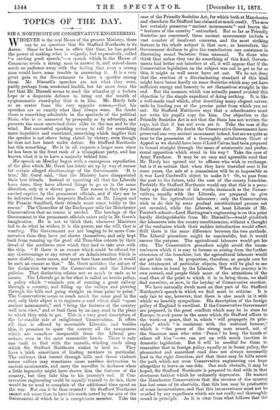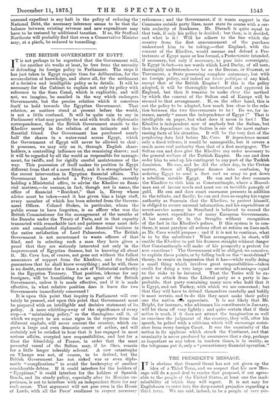TOPICS OF THE DAY.
BM S. NORTHCOTE ON CONSERVATIVE ENGINEERING.
WHOEVER is the real Moses of the present Ministry, there can be no question that Sir Stafford Northcote is its Aaron. Since he has been in office this time, he has gained the power of making what is vulgarly, but expressively, called "a rattling good speech,"—a speech which in the House of Commons needs a strong man to answer it, and out-of-doors sends an audience away with the feeling that even a strong man would have some trouble in answering it. It is a very great gain to the Government to have a speaker among them. Mr. Disraeli's speeches are not what they were, partly perhaps from weakened health, but far more from the fact that Mr. Disraeli seems to need the stimulus of a forlorn hope or a desperate defence to bring out the wealth of epigrammatic sword-play that is in him. Mr. Hardy fails as an orator from the very opposite reason,—that his speeches are so exactly what they always were. No doubt there is something admirable in the spectacle of the political Stoic, who is as unmoved by prosperity as by adversity, and presents the same unexcited front alike to the sun and to the wind. But successful speaking seems to call for something more impulsive and emotional, something which implies that the speaker is not above being elated by victory, even though he does not lose heart under defeat. Sir Stafford Northcote has this something. He is in all respects a larger man since he has been in the front rank of a triumphant party, and has known what it is to have a majority behind him.
His speech on Monday began with a courageous repudiation of the plea which Mr. Gorst has lately set up by way of excuse for certain alleged shortcomings of the Government. It is true,' Mr. Gorst said, ' that the Ministry have disappointed their best friends. Instead of upsetting all that the Liberals have done, they have allowed things to go on in the same direction, only at a slower pace. The reason is that they are carried captive by the permanent officials, and if they are to be delivered from such desperate Radicals as Mr. Lingen and Sir Francis Sandford, their friends must come boldly to the rescue.' The Chancellor of the Exchequer tells the Manchester Conservatives that no rescue is needed. The bondage of the Government to the permanent officials exists only in Mr. Gorst's imagination. He is not to think that, whenever Ministers fail to do what he wishes, it is the power, not the will, that is wanting. The Government are not longing to be more Con- servative than they have yet shown themselves, and only kept back from running up the good old True-blue colours by their dread of the mutinous crew which they had to take over with the ship. " If there is an excuse which could be offered for any shortcomings or any errors of an Administration which is more shabby, more mean, and more base than another, it would be such an excuse as that." Mr. Gorst mistakes the nature of the distinction between the Conservative and the Liberal policies. That distinction relates not so much to ends as to means. The Liberals go in for what is called an heroic policy, a policy which " reminds you of running a great railway through a country, and filling up the valleys and piercing through the hills and going straight on from point to point." The Conservatives mean to reach much the same goal in the end, only their object is to engineer a road which shall "spare ancient monuments," and " bring the features of the country well into view," and so lead them by an easy road to the place to which they wish to get. This is a very good description of the favourable side of enlightened Conservatism. It offers nll that is offered by reasonable Liberals, and besides this, it promises to spare the country all the annoyances which are somehow inseparable from the Liberal pro- cedure, even in the most reasonable hands. There is only one fault to find with the smooth, winding roads along which Sir Stafford Northcote wishes to lead us. They have a trick sometimes of leading nowhere in particular. The railways that tunnel through hills and throw viaducts across valleys may sometimes cause needless destruction to ancient monuments, and carry the traveller in darkness when a little ingenuity might have shown him the features of the country, but they take him to his journey's end. If Con- servative engineering could be equally trusted to do this, there would be no need to complain of the additional time spent on the way. But can it be thus trusted ? Sir Stafford Northcote cannot ask more than to have his words tested by the acts of the Government of which he is a conspicuous member. Take the
case of the Friendly Societies Act, for which both at Manchester and elsewhere Sir Stafford has claimed so much credit. The new law certainly preserves "ancient monuments" and leaves the " features of the country " untouched. But so far as Friendly Societies are concerned, these ancient monuments include a vast number of insolvent concerns, and the most striking feature in the whole subject is that now, as heretofore, the Government declines to give the contributors any assistance in
discerning sound Societies from unsound. To those who think that unless they can do something of this kind, Govern- ments had better not interfere at all, it will appear that if the Conservative legislation on the subject was not to get so far as this, it might as well never have set out. We do not deny that the erection of a discriminating standard of this kind might have borne hardly on some Societies which may yet have sufficient energy and honesty to set themselves straight in the end. But the measure which was actually passed avoided this objection by the simple expedient of doing nothing. It is like a well-made road which, after describing many elegant curves, ends by landing you at the precise point from which you set out. Sir Stafford Northcote says that a schoolmaster must not write his pupil's copy for him. Our objection to the Friendly Societies Act is not that the State has not written the copy, but that it has not even set it. Take the case of the Judicature Act. No doubt the Conservative Government have preserved one very ancient monument indeed, but arewe quite as near to the possession of a thoroughly satisfactory Court of Appeal as we should have been if Lord Cairns had been prepared to tunnel straight through the mass of aristocratic and profes- sional opposition which stood in his way ? Take the case of Army Purchase. It may be an easy and agreeable road that Mr. Hardy has opened out to officers who wish to exchange, but is it so certain that when they have travelled over it for some years, the sale of a commission will be as impossible as it was Lord Cardwell's object to make it ? Or, to pass from the past to the future, take the case of the county franchise. Probably Sir Stafford Northcote would say that this is a pecu- liarly apt illustration of his words, inasmuch as the Conser- vatives, equally with the Liberals, are prepared to give votes to the agricultural labourers ; only the Conservatives wish to do this by some gradual constitutional process not yet revealed, while the Liberals, at least Liberals of Mr.. Forster's school—Lord Hartington's engineering is on this point hardly distinguishable from Mr. Disraeli's—would pitchfork the labourers into the county constituencies, without a thought of the confusion which their sudden introduction would effect. Still there is the same difference between the two methods. The Liberal procedure might be unscientific, but it would answer the purpose. The agricultural labourer would get his vote. The Conservative procedure might avoid the incon- veniences which it is easy to foresee as arising from the further extension of the franchise, but the agricultural labourer would" not get his vote. In proportion, therefore, as people care for the attainment of particular objects, they will be glad to see them taken in hand by the Liberals. When the journey is its own reward, and people think more of the attractions of the road than of the point to which it is to bring them, we shalt find ourselves, as now, in the heyday of Conservative reaction.. We have naturally dwelt most on that part of Sir Stafford Northcote's speech in which we find most to criticise. It is only fair to say, however, that there is also much in it with which we heartily sympathise. His description of the foreign policy of England is excellent. If the Conservative Government are prepared, in the great conflicts which may be in store for Europe, to seek peace in the sense which Sir Stafford affixes to the word—a peace, that is, which " will propagate its prin- ciples," which " is consistent with the national honour,' which is " the peace of the strong man armed, not of the timorous man who cries ' Peace 1' to keep the hands of others off him "—we can put up with much inaction in domestic legislation. But it will be needful for them to remember that in foreign policy, equally as in home policy, the pleasantest and smoothest road does not always necessarily lead in the right direction, and that there may be hills across the path which not even Conservative engineering can hope altogether to leave on one side. One such obstacle, it may be hoped, Sir Stafford Northcote is prepared to deal with in that strenuous fashion which he ordinarily deprecates. He warned the Manchester Conservatives that the revenue of the country has lost some of its elasticity, that this loss may be productive of some inconvenience, and that this inconvenience must not be avoided by any expedients which are not really and thoroughly sound in principle. As it is clear from what follows that the
unsound expedient is any halt in the policy of reducing the National Debt, the necessary inference seems to be that the balance between existing revenue and new expenditure may have to be restored by additional taxation. If so, Sir Stafford Northeote will probably find that even a Conservative Minister may, at a pinch, be reduced to tunnelling.







































 Previous page
Previous page